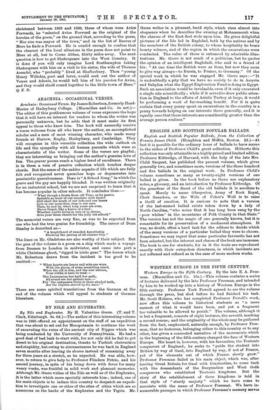Arachnia : Occasional Verses. By James Robertson, formerly Head- Master
of Haileybury College. (Macmillan and Co. 5s. net.)— The editor of this posthumous volume of verse expresses the hope that it will have an interest for readers to whom the writer was personally unknown, but he adds that it must make its first appeal to those who knew him. The book will assuredly receive a warm welcome from all who knew the author, an accomplished scholar and a man of most winning character, who made many friends at Harrow, Rugby, Haileybury, and Cambridge. They will recognise in this versatile collection the wide outlook on life and the sympathy with all human pursuits which were so characteristic of the writer. Some of the verses are playful ; they are interesting as bringing out the author's genuine love of fun. The graver poems reach a higher level of excellence. There is in them a vein of pensive reflection which touches deeper chords. But the sense of the sadder aspects of life which are fully felt and recognised never quenches hope or degenerates into pessimistic querulousness. Here is "A School Song," in which the grave and the gay are happily blended. It was written originally for an industrial school, but we are not surprised to learn that it has become popular in other schools. It concludes thus :— " What though a frown from old Time, as he passes, Sprinkle an hour of our sunshine with tears P Still shall the laugh of our lads and our lasses Live in our memories, ring in our ears. Then, by and by, when long years are over, Never forget, like a knave or a fool:
Whether you're living in care or in clover, Give your three cheers for the jolly old school"
The memorial verses are very fine, as was to be expected from one who had the true genius for friendship. The career of Dean Stanley is described as-
" A knighthood of unsoiled Apostleship Shaming the jarring of all coarser fray."
The lines on Mr. Gladstone are also worthy of their subject. But the gem of the volume is a poem on a ship which made a voyage from Bremen to London in midwinter, and came into port a white Christmas ghost, "rigged in icicle gear." The lesson which Mr. Robertson draws from the incident is too good to be omitted :—
" When hearts are heavy and wits are worn With the gloom of some crumbling creed,
When the old is dim, and the new unborn, Your riddle is here to read:—
The Lanresmina has held her path, All sound are her gallant tars:— For the compasses froze in their alcohol bath, But the Captain steered by the stars.' "
There are some spirited translations from the German at the end of the volume which will appeal to students of German literature.
BY NILE AND EUPHRATES.






















































 Previous page
Previous page